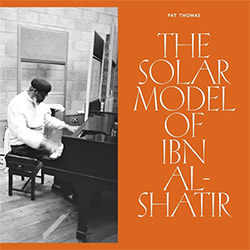
The fourth solo piano album from British improviser Pat Thomas on Otoroku, recorded at London's Fish Factory and drawing from his Sufi faith and the legacy of Arabic scientific innovation, as Thomas explores cosmic motion and spiritual resonance through dynamic inside-piano techniques, harmonic clusters, and deeply personal, rhythmically charged improvisations.
In Stock
Quantity in Basket: None
Log In to use our Wish List
Shipping Weight: 3.00 units
Sample The Album:
Pat Thomas-piano
Click an artist name above to see in-stock items for that artist.
UPC: 5056321696984
Label: Otoroku
Catalog ID: ROKU 040CD
Squidco Product Code: 36045
Format: CD
Condition: New
Released: 2025
Country: UK
Packaging: Digipack
Recorded at the Fish Factory, in London, UK, on March 6th, 2024, by Benedic Lamdin. Mastered by Giuseppe Ielasi.
"Pat Thomas returns to OTOROKU for his fourth collection of solo piano improvisations, this time recorded in a studio setting at London's Fish Factory.
For 25 years now, beginning with Nur (Emanem) and continuing through Al-Khwarizmi Variations (Fataka), The Elephant Clock of Al-Jazari (OTOROKU), and now The Solar Model of Ibn Al-Shatir, Pat Thomas has drawn on the Arabic world for titles for his solo piano work - specifically the long-standing Islamic tradition of astronomical invention. For Thomas, the work of the polymaths he dedicates his music to has been sidelined by Eurocentrism, just as the Arabic origin of "jass" and the scalar, intervallic and polyphonic contributions made by Arab musicians have been routinely overlooked. Islamic innovation is at the heart of Thomas' solo projects and draws a direct link between his Sufi faith and a totally unique style of playing. Each of his solo piano records is a dedication - not just to the innovators Thomas names but to the beauty of the universe in all its complexities.
Starting standing up with one hand inside the piano and one on the keys, The Solar Model begins with single staccato bass notes appearing like chondrites in the darkness, occasionally tumbling towards a rhythm and then falling out of it. Metallic string work starts to pull towards an unseen centre and eventually notes from the upper registers appear, clear and light. With both hands drawn to the keys, Thomas builds towards scintillating beauty, carried through "The Laws of Motion" and propelling us towards the A-side closer, "For George Saliba". Notes fall rapidly, colliding to form a crowded core with a warped sort of bebop in its middle - distinctive Pat with a nod to the Duke's groove. The whole landscape of the A side swings with this one movement, until its energy is spent on one last sweeping rotation.
On the B-side, "The Oud of Ziryab" notes to the instrument maker who added a 5th pair of strings to the Oud. The single bass notes of the first side are swapped for clusters, bursting together and decaying in space. Making use of the sustain pedal and the silence of a studio setting, it's one of the most open, lush recordings of Thomas at the piano we've heard - more Muhal Richard Abrams than Monk, the lower end thundering under rapid, crystalline blues. "For Mansa Musa" brings back a swing instantly recognisable as Pat, with a huge euphoric lift halfway that crowns the record but the album's end title "The Birds are Singing" is more celestial, more chromatic - a reminder that the spiritual matters just as much as the physical for Thomas."-Otoroku
"Pat Thomas studied classical piano from aged 8 and started playing Jazz from the age of 16. He has since gone on to develop an utterly unique style - embracing improvisation, jazz and new music. He has played with Derek Bailey in Company Week (1990/91) and in the trio AND (with Noble) - with Tony Oxley's Quartet and Celebration Orchestra and in Duo with Lol Coxhill."
For 25 years now, beginning with Nur (Emanem) and continuing through Al-Khwarizmi Variations (Fataka), The Elephant Clock of Al-Jazari (OTOROKU), and now The Solar Model of Ibn Al-Shatir, Pat Thomas has drawn on the Arabic world for titles for his solo piano work - specifically the long-standing Islamic tradition of astronomical invention. For Thomas, the work of the polymaths he dedicates his music to has been sidelined by Eurocentrism, just as the Arabic origin of "jass" and the scalar, intervallic and polyphonic contributions made by Arab musicians have been routinely overlooked. Islamic innovation is at the heart of Thomas' solo projects and draws a direct link between his Sufi faith and a totally unique style of playing. Each of his solo piano records is a dedication - not just to the innovators Thomas names but to the beauty of the universe in all its complexities.
Starting standing up with one hand inside the piano and one on the keys, The Solar Model begins with single staccato bass notes appearing like chondrites in the darkness, occasionally tumbling towards a rhythm and then falling out of it. Metallic string work starts to pull towards an unseen centre and eventually notes from the upper registers appear, clear and light. With both hands drawn to the keys, Thomas builds towards scintillating beauty, carried through "The Laws of Motion" and propelling us towards the A-side closer, "For George Saliba". Notes fall rapidly, colliding to form a crowded core with a warped sort of bebop in its middle - distinctive Pat with a nod to the Duke's groove. The whole landscape of the A side swings with this one movement, until its energy is spent on one last sweeping rotation.
On the B-side, "The Oud of Ziryab" notes to the instrument maker who added a 5th pair of strings to the Oud. The single bass notes of the first side are swapped for clusters, bursting together and decaying in space. Making use of the sustain pedal and the silence of a studio setting, it's one of the most open, lush recordings of Thomas at the piano we've heard - more Muhal Richard Abrams than Monk, the lower end thundering under rapid, crystalline blues. "For Mansa Musa" brings back a swing instantly recognisable as Pat, with a huge euphoric lift halfway that crowns the record but the album's end title "The Birds are Singing" is more celestial, more chromatic - a reminder that the spiritual matters just as much as the physical for Thomas."-Otoroku
"Pat Thomas studied classical piano from aged 8 and started playing Jazz from the age of 16. He has since gone on to develop an utterly unique style - embracing improvisation, jazz and new music. He has played with Derek Bailey in Company Week (1990/91) and in the trio AND (with Noble) - with Tony Oxley's Quartet and Celebration Orchestra and in Duo with Lol Coxhill."
'>Also available as a Vinyl LP>Artist Biographies
• Show Bio for Pat Thomas "Born 27 July 1960; Piano, electronics. Pat Thomas started playing at the age of 8 and studied classical music and played reggae. He began playing jazz at sixteen after seeing Oscar Peterson on television then listened to snatches of jazz on the radio before, in 1979, playing his first serious improvised gigs. From 1986 he played with Ghosts which was Pete McPhail and Matt Lewis. In addition to programming his keyboards, Pat Thomas also utilises prerecorded tapes. He told Chris Blackford (1991), 'As far as the tapes are concerned I'll probably just sit in front of the TV and tape whatever's going on and so some editing afterward to decide what might be useful. ...But I don't actually put a label on each tape saying what's on there, so when I come to use them I don't know what I'm going to be playing. That obviously prevents me from setting things up. I pick them at random and see what happens. So I'm just as surprised as anybody else at what comes out'. In 1988 he was awarded an Arts Council Jazz Bursary to write three new electroacoustic compositions for his ten-piece ensemble, Monads: Roger Turner and Matt Lewis, percussion; Pete McPhail, WX7 wind synthesizer; Neil Palmer, turntables; Phil Minton, voice; Phil Durrant, violin; Marcio Mattos, bass; Jon Corbett, trumpet; Geoff Searle, drum machines. The intention was to feature different aspects of electronics using improvisation so, for example, one piece - Dialogue - featured Pete McPhail and Neil Palmer, another concentrated on the interaction of percussionists and drum machines, and a third piece had Phil Minton and Jon Corbett improvising with a computer. The pieces were performed at the Crawley Outside-In Festival of new music in 1989. Pat Thomas was invited by Derek Bailey to play in Company Week in 1990 and 1991 and he also took part in the Ist International Symposium for Free Improvisation in Bremen with the guitarist. He has been a member of the Tony Oxley Quartet (documented on Incus CD 15) and played in Oxley's Angular Apron along with Larry Stabbins, Manfred Schoof and Sirone at the 8th Ruhr Jazz Meeting and in the percussionist's Celebration Orchestra. He plays with Lol Coxhill in a range of combinations from duo to being a member of 'Before my time', is a member of Mike Cooper's Continental Drift, and he has a well established duo with percussionist Mark Sanders and a trio with Steve Beresford and Francine Luce. In 1992 Pat Thomas formed the quartet Scatter with Phil Minton, Roger Turner and Dave Tucker; funded by the Arts Council they toured the UK in 1993 and again at the beginning of 1997. On the 'Festival circuit', Pat Thomas has appeared at: the Young Improvisors Festival at the Korzo Theatre, Den Haag (with Jim O'Rourke, Mats Gustafsson and Alexander Frangenheim); Angelica 95 in Bologna, Italy; the Stuttgart 5th Festival of Improvised Music 96 (with Fred Frith, Shelly Hirsch, Carlos Zingaro and others); and the 3rd International Festival 96 in Budapest (with Evan Parker, Phil Minton, John Russell and Roger Turner). ^ Hide Bio for Pat Thomas
4/2/2025
Have a better biography or biography source? Please Contact Us so that we can update this biography.
Track Listing:
1. The Solar Model 13:52
2. The Laws Of Motion 3:27
3. For George Saliba 3:43
4. The Oud Of Ziryab 4:47
5. For Ibn Al-Nafis 4:18
6. For Mansa Musa 3:44
7. The Birds Are Singing 6:01
Improvised Music
Jazz
Free Improvisation
London & UK Improv & Related Scenes
Piano & Keyboards
Instruments with Preparations
Solo Artist Recordings
New in Improvised Music
Recent Releases and Best Sellers
Search for other titles on the label:
Otoroku.


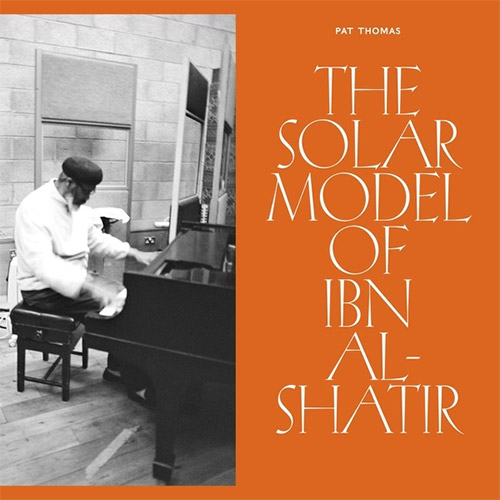
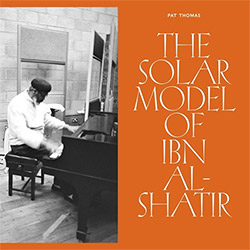

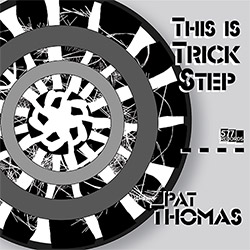
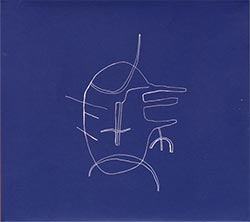

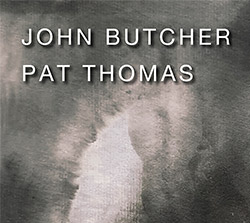
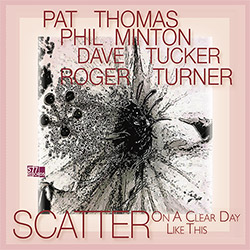
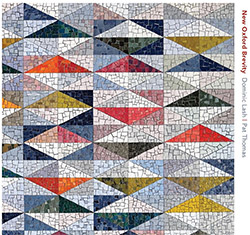

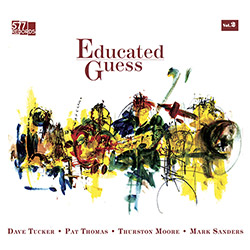



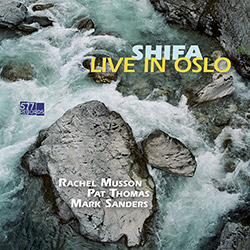
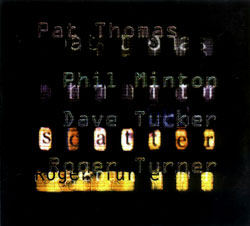

![Niblock, Phill / Anna Clementi / Thomas Stern: Zound Delta 2 [VINYL]](https://www.teuthida.com/productImages/misc4/34623.jpg)
![Yoko, Ono / The Great Learning Orchestra: Selected Recordings From Grapefruit [2 CDs]](https://www.teuthida.com/productImages/misc4/35841.jpg)

![Brotzmann, Peter / John Edwards / Steve Noble / Jason Adasiewicz: The Quartet [2 CDs]](https://www.teuthida.com/productImages/misc4/35975.jpg)
![Brotzmann, Peter / John Edwards / Steve Noble / Jason Adasiewicz: The Quartet [VINYL 2 LPs]](https://www.teuthida.com/productImages/misc4/35976.jpg)



![Rodrigues, Ernesto / Nuno Torres / Guilherme Rodrigues: Whispers In The Moonlight - In Seven Movements [2CDs]](https://www.teuthida.com/productImages/misc4/35765.jpg)



![Cocks, Laura: FATHM [VINYL]](https://www.teuthida.com/productImages/misc4/36055.jpg)










![Ackerley / Prymek / Turner: All Hope With Sleeping Minds [CASSETTE]](https://www.teuthida.com/productImages/misc4/35950.jpg)
![Myers, David Lee : Tin Drop Tear [BOOK w/ DOWNLOAD]](https://www.teuthida.com/productImages/misc4/36030.jpg)




![Schindler, Udo / Sandy Ewen / Damon Smith: Munich Sound Studies Vols. 4, 5 & 6 [3 CDs]](https://www.teuthida.com/productImages/misc4/35966.jpg)
![Turbulence Orchestra & Sub-Units: Smear Out the Difficulties (Double Live) [2 CDs]](https://www.teuthida.com/productImages/misc4/36048.jpg)


![Perelman, Ivo / Tyshawn Sorey: Paralell Aesthetics [2 CDs]](https://www.teuthida.com/productImages/misc4/35871.jpg)


![Sjostrom, Harri: SoundScapes #4 Festival Berlin 2023 [3 CDs]](https://www.teuthida.com/productImages/misc4/35874.jpg)



![Glenn, Jordan: Flustered [CASSETTE]](https://www.teuthida.com/productImages/misc4/35948.jpg)










![Olencki, Weston : Pearls Ground Down To Powder [VINYL]](https://www.teuthida.com/productImages/misc4/35956.jpg)
![Myers, David Lee: Oculus [2CDs]](https://www.teuthida.com/productImages/misc4/35857.jpg)


![dustsceawung: dustsceawung [CASSETTE w/ Download]](https://www.teuthida.com/productImages/misc4/35753.jpg)




![Halls of the Machine: Atmospheres For Lovers And Sleepers [CASSETTE w/ DOWNLOAD]](https://www.teuthida.com/productImages/misc4/35806.jpg)



![AHC (Alexander Cooper): Lase [2 CDs]](https://www.teuthida.com/productImages/misc4/35754.jpg)



![Fagaschinski, Kai / Yan Jun : Graveyard Processions [VINYL w/ DOWNLOAD]](https://www.teuthida.com/productImages/misc4/35474.jpg)









![Zorn, John / JACK Quartet: The Complete String Quartets [2 CDs]](https://www.teuthida.com/productImages/misc4/35609.jpg)

![Lonsdale, Eden: Dawnings [2 CDs]](https://www.teuthida.com/productImages/misc4/35480.jpg)







![Sanna, Claudio: Compositori Sardi Contemporanei II [2 CDs]](https://www.teuthida.com/productImages/misc4/35317.jpg)







![Zurria, Manuel: Fame di Vento [3 CDs]](https://www.teuthida.com/productImages/misc4/35167.jpg)


![Electric Bird Noise / Derek Roddy: 8-10-22 [CD EP]](https://www.teuthida.com/productImages/misc4/35970.jpg)








![Elephant9 : Mythical River [VINYL]](https://www.teuthida.com/productImages/misc4/34624.jpg)



![Elephant9 with Terje Rypdal: Catching Fire [VINYL 2 LPs]](https://www.teuthida.com/productImages/misc4/35355.jpg)
![Deerlady (Obomsawin, Mali / Magdalena Abrego): Greatest Hits [VINYL]](https://www.teuthida.com/productImages/misc4/34876.jpg)







![Surplus 1980: Illusion of Consistency [CD]](https://www.teuthida.com/productImages/misc4/35069.jpg)
![Staiano, Moe: Away Towards the Light [VINYL + DOWNLOAD]](https://www.teuthida.com/productImages/misc4/35037.jpg)



![Caveira (Gomes / Sousa / Abras / Ferrandini): Ficar Vivo [VINYL]](https://www.teuthida.com/productImages/misc4/34643.jpg)
![Coley, Byron: Dating Tips for Touring Bands [VINYL]](https://www.teuthida.com/productImages/misc4/17906.jpg)

![Lost Kisses: My Life is Sad & Funny [DVD]](https://www.teuthida.com/productImages/misc4/lostKissesDVD.jpg)